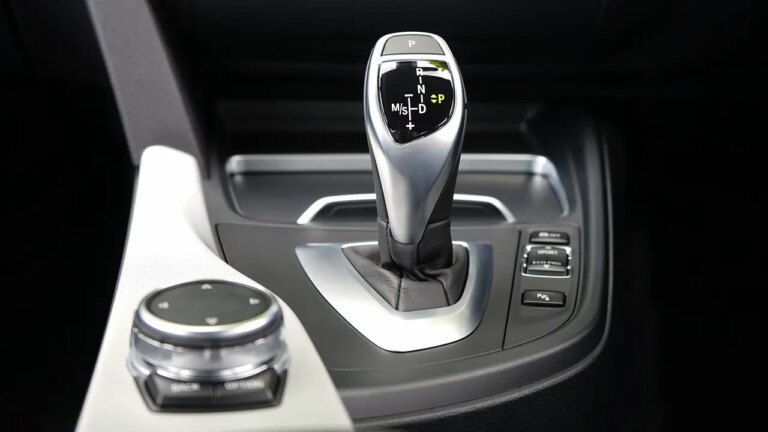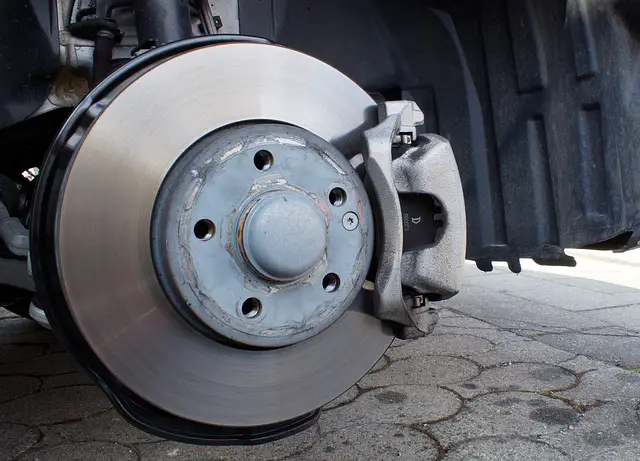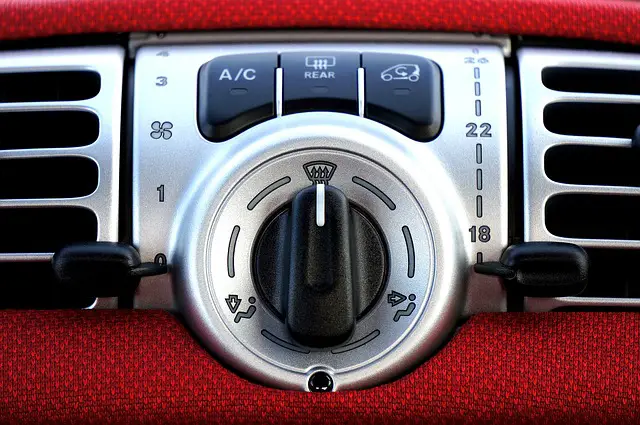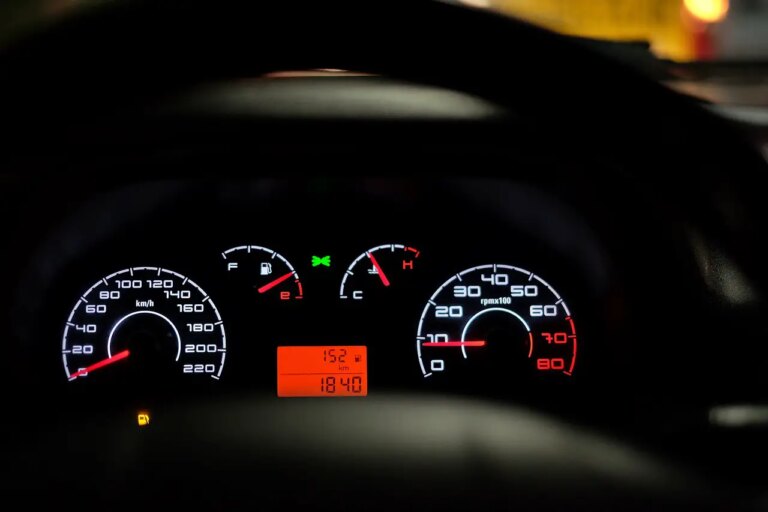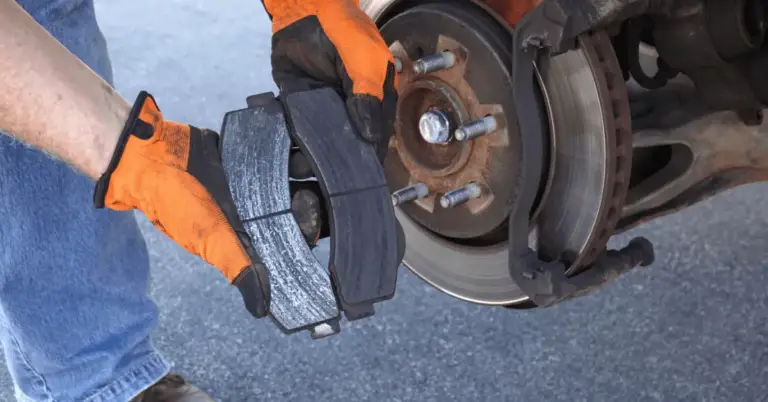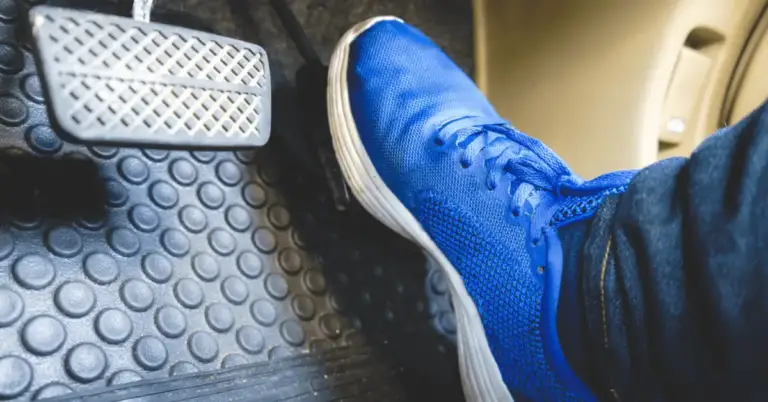Backing out of your drive early in the morning and hearing your car brakes squeak when you hit the pedal can be a bit embarrassing. You’ve taken your time and been extra quiet to not disturb your neighbors, but now your brakes have undone all the good work.
Here we’ll examine the causes and any things you can do to stop it squealing.
Sorry about this, It may seem obvious, so we won’t dwell on it.
The first and most obvious thing you can do that doesn’t involve making any changes to your brakes or driving style is to back your car into the garage on the drive when you park it the night before.
If your car only squeaks when reversing, that’ll take away the one situation when this sound occurs. It may take you an extra 30 seconds to back up the drive at the end of a long day, but it’ll be less stressful the following morning.
Now we’ve got the most obvious solution; we can explore why it happens.
Brake Pad Moving In The Caliper
Brake pads normally fit nicely and tightly in the caliper. However, all matter, including brake pads, will expand and contract a few mm depending on the outside temperature. Now often overnight, the temperature will drop more than a few degrees.
When this happens, the brake pads will shrink just a little. That’s all it will take for them to vibrate rapidly against the rotor when you push the brake pedal.
I hear you say all well and good, but if this were true, it would happen driving forwards and backward. That brings us to the next cause.
Going A Different Way
Even though brakes work when going forward and back they spend most of their time braking when we are moving forward.
As we hardly ever get over ten mph in reverse gear, they never work as hard as they do in forward gear when we often have to decelerate from 50 mph +.
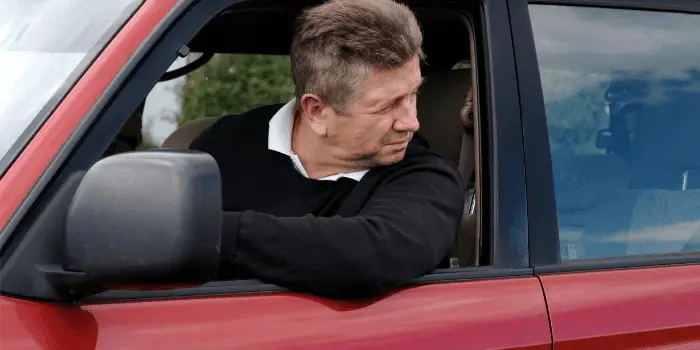
Almost all of the scoring ( cut marks ) on the pads are created by braking when moving forward; any braking in reverse goes against the grain of these cuts and can cause skipping and the noises that go with that.
Getting noise when you’re turning and reversing? Check out our in-depth article: Getting noise when reversing and turning?
Condensation on Rotor
Are your car brakes squealing only when you back out in the morning, or is this happening at all times of the day?
Brake rotors will get wet overnight because of condensation, especially from September to April. If they are wet because of rain or snow, this can happen at any time of the year.
Condensation acts as a lubricant between the pads and the rotors. If you’re backing off the drive in the morning and there is dew all around, or it has rained overnight, and you hear a squeak, this is often the cause.
Consider this, though. You are more likely to hit the brakes when reversing to come to a stop to engage a forward gear. If you start in a forward gear, you may not have to touch the brake pedal until you are away from home.
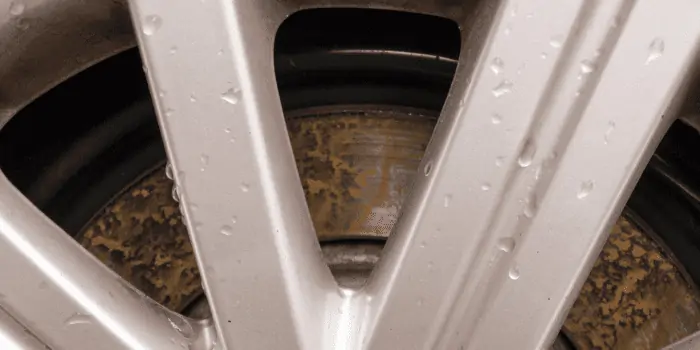
The moisture on the rotors is there, whatever, but reversing needs the brakes to be used more than driving forward when you maneuver your car in the morning.
Of course, this would still happen if the car was reversed into your drive the night before and driven off forward. However, at this time, the moisture has probably been removed by the frictional heat of your braking during your drive home.
Emergency Brake Rear Wheels Sticking
This brake engages the rear wheels when you lift the lever or flick the switch in the cabin. Because they are subjected to a ton of moisture and grime from being under the car, they are prone to sticking, and being operated by cables rather than hydraulics amplifies this. Often this will trigger a light to come on in the cluster but not always.
This is only a potential cause if you have just noticed the noise. Although the parking brake is on a different circuit, it uses the rear drums or pads to lock the wheels. You’ll soon wear the rear brakes if you drive with them stuck on, which will be noticeable when you come to brake and realize the brakes aren’t working well.
Once again – you would think this noise would be heard in forward or reverse gear. We are more likely to hear the noise as we reverse at a lower speed than when we accelerate in a forward gear.
Steering Wheel Squeak Reverse
Are you sure it’s the brakes that are causing the squeak? I ask because we often use a full steering lock when reversing out of a driveway and onto a road.
We may not use a full lock at any other time that day. In this scenario, it could be a steering-related issue as we will often press the brake pedal to stop the car at full lock before shifting it into a forward gear and driving away.
If the serpentine belt isn’t running the power steering pump effectively and when asked – at full lock – to provide more hydraulic power, it protests and squeals. This is more likely on cooler damp mornings when we have other electrical systems, such as climate control and heated seats.
In Conclusion
The most likely causes of brakes squeaking when backing up are:
- Condensation on the rotor
- The pad squealer rubbing
- Parking brake squeaking
- Pads moving slightly in the caliper
- Going in reverse
If you’re not encountering any other brake issues, this problem is more of an inconvenience than a safety concern. If your car is brand new and under warranty, call the dealership and get the car booked to be checked over. They may replace the pads and rotors.
For most cars, though, it’s just a quirk of nature that can be easily solved by reversing the car into the drive at the end of the day or reversing out in the morning a bit more quickly and hitting the brakes hard just once.
This will normally cause the brakes to give out one louder squeal rather than a series of smaller ones as you edge out of the drive more slowly. Think of it as taking a band aid off quickly and getting the pain out of the way quicker.
Other related articles
If your new brakes are squealing, that may be because they need bedding in.


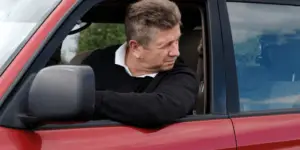
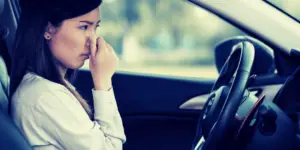
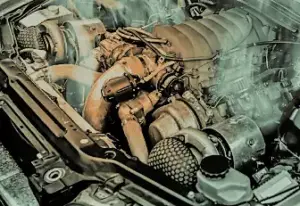
![Can Dirty Brake Fluid Cause Squeaky Brakes? [ANSWERED] DOT-3-Brake-Fluid](https://carzaza.com/wp-content/uploads/2023/12/DOT-3-Brake-Fluid-300x161.png)
![How Long Do New Tires Take To Put On? [ANSWERED] Torque-wrench-tire](https://carzaza.com/wp-content/uploads/2023/12/Torque-wrench-tire-300x150.png)
